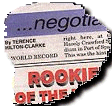

Human error by De la Hoya
By Terence Hilton-Clarke
(c)copyright
![]()
YOU always know when a decision has gone in favour of the less deserving fighter.
The verdict is announced and, suddenly, your body jerks upright. You stare unbelievingly at the screen in front of you. While your eyes focus on the unfolding events, your mind immediately tries to conjure up sort of some logic in the judgement - on many occasions, an exercise in vain.
One of the most egregious decisions in the history of boxing occurred at the end of last March’s infamous heavyweight championship fight between Lennox Lewis and Evander Holyfield. There was definitely no logic to be found as a seemingly dominant performance by Lewis only earned him a draw.
To be fair, the decision in the Oscar De La Hoya-Felix Trinidad welterweight championship bout was not bad enough to be considered “Hall of Shame” material. Still, it caused some dismay for much of the boxing world, outside of Puerto Rico. At the end of the fight, one could not help but be overwhelmed by different feelings: there was the feeling that De La Hoya had done enough to win the fight; the view that an out-boxed Trinidad had not even won enough rounds to warrant a favourable decision. Nevertheless two of the three judges, Bob Logist and Jerry Roth, scored the fight in favour of Trinidad, while the third, Glen Hamada, had the bout even.
Just six months after the Holyfield-Lewis fiasco and there were already some new conspiracy theories. Were certain shady figures already looking ahead to a lucrative rematch? Miami Herald sports columnist, Linda Robertson, was one of those who smelled a rat:
“There’s just too much money at stake not to wonder who has thrust their greedy hands into the pot. De La Hoya stands to make $28 million after the TV pay-per-view profits are calculated. What would a rematch command? Unlike Hollywood sequels, boxing rematches are even bigger at the box office.”
But, as suggested before, there is little evidence to suggest that there were any hidden agendas involved in this one. Instead, there is another feeling: that the final decision was related to a human error and that the one person, who made the most serious mistake on the night of September 18, was Oscar De La Hoya, himself.
The “Golden Boy” simply put too much faith in the judges at ringside as he gave away the remaining three rounds of a fight that he had largely dominated. He displayed little urgency as Trinidad peppered him with some powerful combinations during the final nine minutes.
Nevertheless, things still seemed in favour of De La Hoya who already had enough rounds in the bag – or so it seemed. While it appeared that the East Los Angeles, California native won rounds 5 to 9 - after splitting the first four rounds 2-2 - the scoring of the judges reflected differing interpretations.
This is where the problem lay for De La Hoya. In boxing, it is very difficult to find two people who harbour similar interpretations of close fights. Because Trinidad was never really rattled by De La Hoya, he was able to stay in there and keep the rounds close. As fight analyst Harold Lederman revealed in his report on the HBO web site (www.hbo.com), there were only seven rounds – two, three, four, five, six, ten and eleven - for which all
three judges were unanimous in their scoring. Otherwise, there were crucial differences when it came to the other five rounds of the fight. It was these variations that belied De La Hoya’s sense of security going into round ten.Even in rounds that he had seemingly won - seven, eight and nine - there were dissenting opinions. Logist gave round seven to Trinidad. Similarly, judge Hamada favoured the Puerto Rican in a close round eight. And, while it seemed that round nine represented De La Hoya’s last winning effort, only Hamada scored in his favour: the others gave the nod to Trinidad. Thus, at the end of nine rounds, the scoring was like this: Hamada had Oscar leading 87-84; but Roth had awarded four rounds to Trinidad and, therefore, only gave De La Hoya an 86-85 edge; Logist, meanwhile, had it even at 86-86.
Oscar should not have given away those last three rounds.
Instead, apparently already confident of victory, he never showed any of the finishing venom that had highlighted his efforts against Pernell Whitaker and Ike Quartey. Oscar should have simply drawn upon this virtue and should have continued to throw punches at Trinidad. Oscar should have thrown down the gauntlet and countered Trinidad with his own firepower.
But the warrior decided to take a gamble and ended up being scalped in Las Vegas.
| More
Sports with other sports articles divided in categories
|




